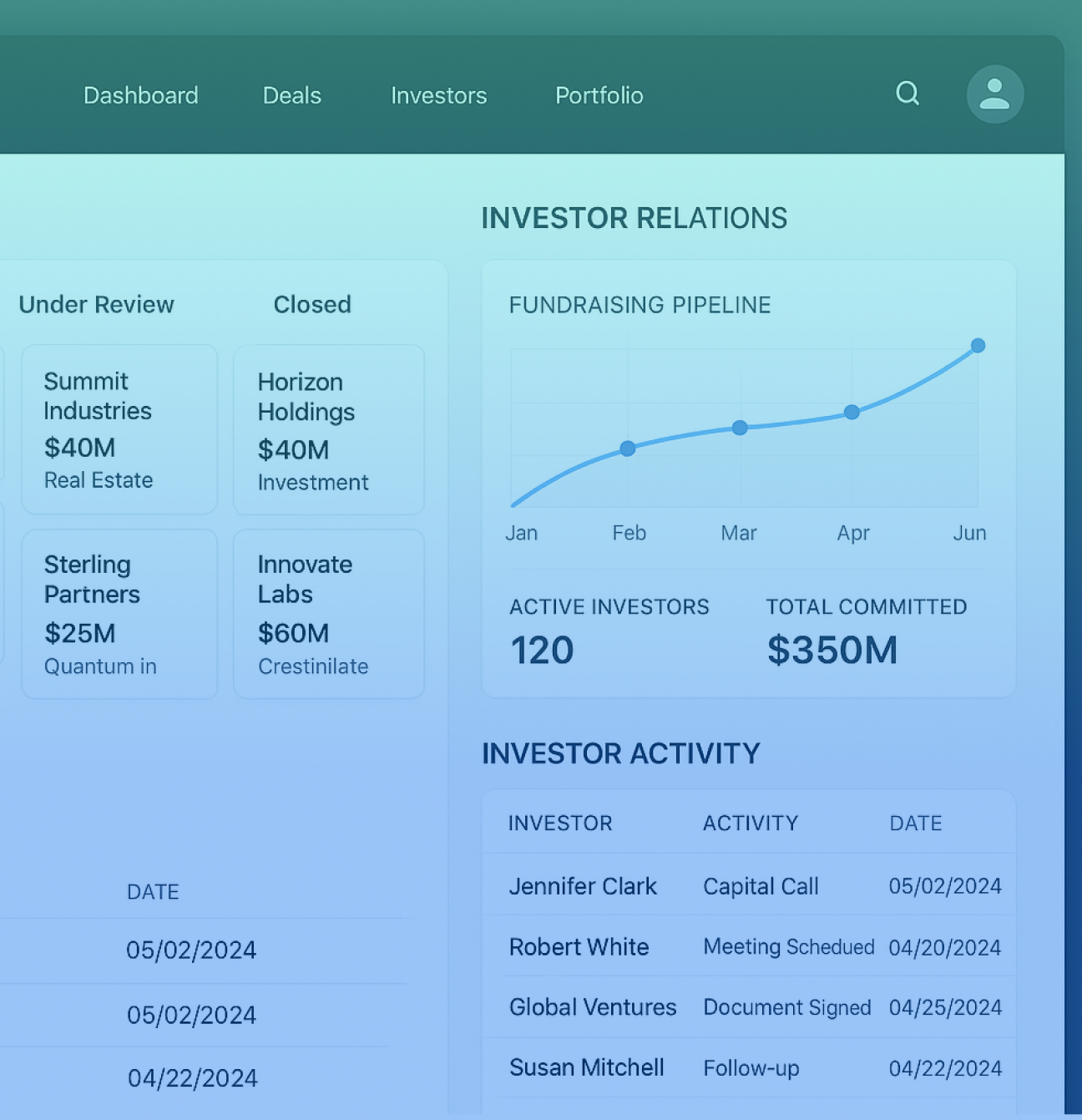Business runs on relationships, especially in the M&A world. Effectively documenting, tracking, and managing those relationships requires more than a generic CRM — it calls for a platform built specifically for dealmakers.
In this article, we explore the leading CRMs for M&A teams, the essential features to look for, and the scenarios where each solution is most effective.
An Overview of Top CRM Tools for M&A
The Importance of Purpose-Built CRMs
In M&A, relationships, information flow, and timing are everything.
While traditional CRMs can support straightforward sales processes, M&A relies on long-term relationship development and complex, multi-stakeholder workflows. The dealmaking process often involves shifting priorities, evolving expectations, and longer timelines. Without a platform tailored to these nuances, teams end up with siloed data, inconsistent processes, and limited visibility into both relationships and deal flow.
Purpose-built CRMs for M&A address these challenges directly. They centralize deal information, track relationship history across the team, automate data capture, enrich company profiles with third-party data, and provide workflows that match real dealmaking processes. The result is not just better organization — it’s stronger sourcing, deeper
Key Features to Look for When Choosing a CRM for M&A
When you work in M&A, selecting a CRM necessitates evaluating tools beyond basic contact management. In selecting a CRM for your tech stack, dealmaking teams should prioritize:
- Relationship Intelligence. The automatic capture of emails, meetings, and client interactions gives your team full visibility of relationships.
- Deal Pipeline Management. Software should offer customization for your firm’s needs and visual pipelines that help teams track deal velocity and identify bottlenecks.
- Data Enrichment. Robust integrations with data platforms and industry databases elevate deal sourcing, qualification, prioritization, and buyer list building.
- Automation and AI Powered Workflows. The reduction of manual work opens opportunities for more high-level strategic work. Advanced platforms now go beyond automation by enabling reasoning-based discovery through tools like agentic search, allowing dealmakers to ask complex, open-ended questions and receive contextual, investment-grade insights instead of static results.. Features like automated follow-ups, reminders, task creation, and meeting logging help teams stay proactive.
- Reporting & Analytics. Custom dashboards for pipeline health, deal performance, and sourcing efficacy support data-driven decisions and inform strategic portfolio planning.
- Security & Compliance. Sensitive deal data requires role-based access, audit logs, and reliable permissions to protect confidentiality throughout the deal process. Additionally, secure spaces to store NDAs and notes reduce email clutter and help centralize decision-making.
Together, these features create a unified platform that supports the full M&A cycle with reduced manual effort and improved workflows.

How to Pick the Right M&A CRM for Your Team
Choosing the right CRM depends on your team’s strategy, deal volume, and workflow complexity. Start by asking these questions:
What is our budget?
Like all financial decisions, budget is going to be an important factor. Different CRMs offer various pricing models, such as per-user subscriptions, tier-based pricing, and pay-as-you-go pricing.
How complex is our pipeline?
High-volume deal teams should prioritize a CRM with structured workflows, advanced analytics, and robust integrations that work with your existing tech stack.
What kind of data do we need?
Together, manual data and physical processes are a recipe for a sluggish workflow. CRMs can offer respite from this through automated data capture and private-company enrichment. With the right platform, your team could also leverage AI-powered operations for a more streamlined, efficient deal cycle.
How are we growing?
You may be a boutique firm now, but what about in 5 years? Select a CRM that can grow alongside your team and support your clientele, whether that means adding new users, expanding pipelines, or adopting more advanced features over time.
Ultimately, the right CRM is the one your team will actually use; one that reduces friction, supports sourcing quality, and creates clarity and consistency across the deal lifecycle.

FAQs About CRMs for M&A
Why can’t I use a traditional sales CRM for M&A?
Traditional CRMs aren’t built for long-cycle dealmaking, multi-stakeholder workflows, or relationship intelligence. They lack features tailored for sourcing, diligence, and tracking strategic conversations.
What is the difference between a CRM and a deal management platform?
Some tools have a narrow focus on pipeline, due diligence, or deal execution, while others (CRMs) focus exclusively on contacts and relationships. M&A CRMs combine all these features to give teams a true end-to-end view of the deal cycle.
Do I need AI or data enrichment in my CRM?
For most M&A teams, yes. Automation and enriched data significantly reduce manual work and make sourcing more efficient and targeted.
Do I have to consider security when selecting an M&A CRM?
Absolutely. Deal data is sensitive, and your CRM needs sufficient access controls, audit logs, encryption, and compliance features to protect confidentiality.
Streamline Relationship Management with Grata’s End-to-End Dealmaking Platform
When it comes to making deals, timing is everything — and fragmented software can cost dealmakers when it matters most. Grata’s all-in-one dealmaking platform helps you navigate private markets and manage your relationships with confidence.
Grata’s CRM Intel integrates seamlessly with Salesforce, Dealcloud, Affinity, and Hubspot to help dealmakers find hidden opportunities and prioritize the right targets, faster. With CRM Intel powering your search, you can use your firm’s proprietary data to find better deals. In just a few clicks, your most important relationship data now lives in Grata and fuels your workflows.
For firms that want to elevate sourcing quality, deepen relationship visibility, and maximize efficiency across the team, Grata is purpose-built to power modern dealmaking. Schedule a demo to get started.











